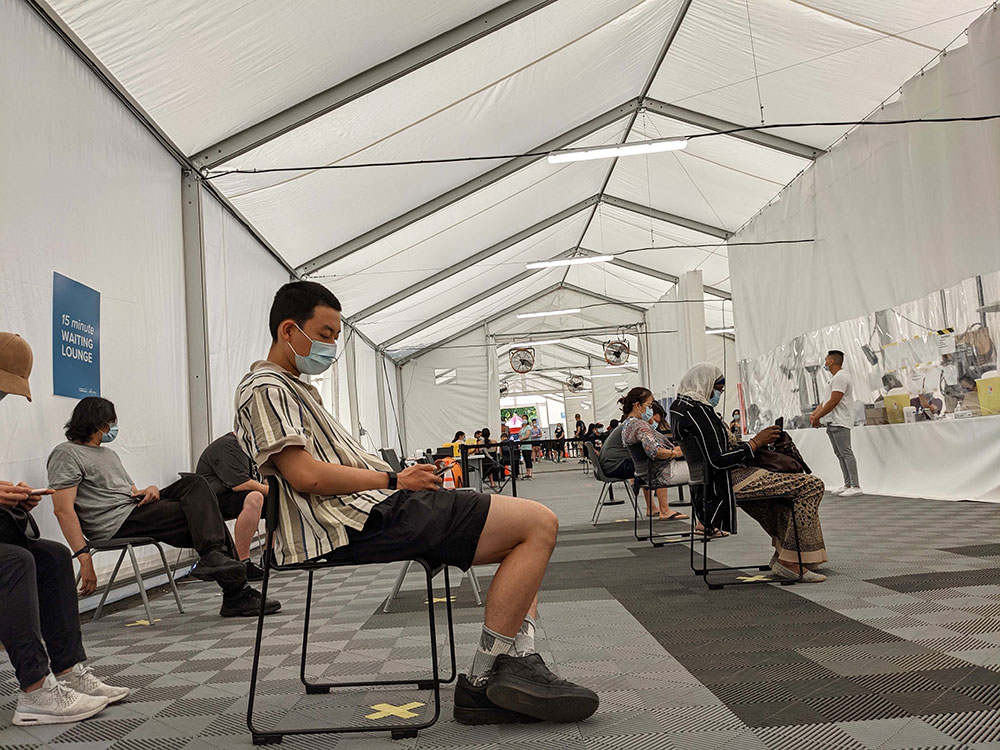A truly life-or-death, three-way struggle is going on around the world — a struggle to determine the response to the next pandemic.
On one side are the minimizers: right-wing and contrarian groups that have wanted to do as little as possible about COVID-19 and the public-health response to it. On another side are the maximizers: scientists and their supporters who hope for the best but want to plan for the worst.
And in the middle are the governments and health agencies trying to do the right thing, which is unlikely to be a compromise between minimizers and maximizers. Few governments and agencies have been blameless in their responses to the ongoing COVID-19 pandemic. But they know any change in policies or planning would be attacked by one side or the other — or both.
Some change is bound to come, however. A number of prominent academics and former political leaders recently published an open letter to World Health Organization member states, reminding them that they are expected to agree on a pandemic accord in May at this year’s World Health Assembly.
The signatories (including former Canadian prime minister Kim Campbell) wrote: “Negotiation of an effective pandemic accord is a much-needed opportunity to safeguard the world we live in. Countries themselves have proposed this instrument, individual countries are negotiating it, and only countries will ultimately be responsible for its requirements and its success or failure.
“Establishing a strong global pact on pandemics will protect future generations from a repeat of the millions of deaths and the social and economic devastation which resulted from a lack of collaboration during the COVID-19 pandemic. All countries need what the accord can offer: the capacity to detect and share pathogens presenting a risk, and timely access to tests, treatments and vaccines.”
Learning the wrong lessons
We might think such an accord could be reached at once, especially after the world has seen millions die of COVID-19 — due in large part to the haphazard, me-first response of the industrialized nations.
But Cambridge political scientist David Runciman argues in the Guardian that our governments suffer from “political long COVID,” making them incapable of functioning effectively. Governments certainly seem to have learned all the wrong lessons in the past four years.
Governments have learned that many of their citizens prefer a healthy economy to a healthy population; that many of their citizens are easy prey for disinformation; that it’s politically costly to try to strengthen public health.
Governments have certainly learned that many of their minimizer citizens will bitterly resist almost any response to another pandemic in the next decade or two. Their maximizers will demand a powerful response regardless of the political hazards. A pandemic accord, then, will be very hard to achieve and even harder to implement.
An accord is likely to be opposed by minimizers who see almost any response to COVID-19 as government over-reach. Here in Canada, Preston Manning published a taxpayer-funded report last year that called for the premier and cabinet of Alberta to approve “any orders or regulations promulgated by the [chief medical officer of health] during a public health emergency” in that province. If premier and cabinet didn’t like the chief officer of health’s advice, however medically sound, they could ignore it.
That was just the start. Collateral Global, a U.K.-registered charity, has launched a “Canada Working Group” to evaluate the COVID response nationwide, with a focus on:
- The social harms from government infection control policies, including on health, economy, income, education, lifestyle, relationships, community and governance.
- The effectiveness of non-pharmaceutical and vaccine interventions, including lockdowns, school closures, contact tracing and mask and vaccine mandates.
- The drivers of decision-making, including emergency laws and the structure of scientific advisory systems.
Terms like “social harms” and “government infection control policies” show the Canada Working Group is more interested in government failures than successes. Those failures will surely be highlighted at a symposium that the group is planning to hold at the University of Toronto this fall.
Many academic minimizers
The Canada Working Group includes an impressive range of academics, including some from B.C.
One of those academics is Dr. Claudia Chaufan, an associate professor in the school of health policy and management at York University, who lists the Canadian COVID Care Alliance as one of her websites on her York University webpage.
The Canadian COVID Care Alliance, in turn, offers an impressive array of anti-mask and anti-vaccine propaganda, enhanced by citations of Florida Surgeon General Dr. Joseph Ladapo, who has been criticized by his own colleagues at the University of Florida. Responding to a measles outbreak recently, Ladapo also left it up to parents of unvaccinated children to keep them at home or send them to school.
These minimizer groups go back to October 2020 and the notorious Great Barrington Declaration, which argued for building “herd immunity” by repeated COVID-19 infection.
The declaration created a rift in the health sciences that may never heal. Maximizers argue that herd immunity depends on vaccination, not multiple infections.
They also know that repeated bouts of COVID-19 only increase the risk of long COVID and organ damage — including brain aging and cognitive decline.
Ignoring long COVID
These effects ought to provoke preventive measures but most governments would prefer not to take them. That is why, though long COVID has now affected at least 3.5 million Canadians, it is rarely mentioned in media. In fact, on Long COVID Awareness Day, media around the world published an Australian report claiming we should stop using the term “long COVID” at all, because its symptoms were no different from the after-effects of influenza.
Julia Doubleday, a notable maximizer, demolished that argument, but for a much smaller readership. Among other points, she asked, “Is it not front-page news that a disease we’ve all been encouraged to repeatedly contract, for the rest of our lives, causes cognitive damage? Aren’t there some concerning implications to the scientific finding that people are losing cognitive ability with every infection, and the entire public is being repeatedly infected with no end in sight?”
Minimizers like the Canadian COVID Care Alliance understand that federal and provincial governments would mostly prefer not to discuss pandemics at all. Vaccine resisters and events like the convoy occupation of Ottawa left politicians and civil servants shaken. Even planning for another pandemic would mean yet another political uproar.
For example, British Columbia has a pandemic influenza plan, published in 2009 during the H1N1 pandemic. It’s of mostly antiquarian interest now, and any new plan would draw fire from many sources.
Support for ‘bodily autonomy’
A new B.C. pandemic plan would surely include provisions for vaccination, and the Conservative Party of BC supports “bodily autonomy," code for freedom to refuse vaccination. (Bodily autonomy actually depends on vaccination; otherwise, infections will hijack our bodies every time they get the chance.)
BC United also supports rehiring health-care workers who refused COVID-19 vaccination. The BC NDP, meanwhile, says nothing at all about vaccination or the pandemic.
After our experiences with COVID-19, controversy has become an inevitable part of pandemic planning. Minimizers see the economic danger of yet another outbreak and the end of civil liberty. Maximizers see the threat to an over-stressed and under-staffed health-care system, and to children and vulnerable groups.
Non-pharmaceutical measures like masking, social distancing and social isolation would become bitterly contentious again, and even the rapid arrival of a safe new vaccine would provoke yet another flood of disinformation-fuelled protests.
Governments and health agencies would also find fewer allies supporting them in planning or in responding to a new pandemic. Maximizer groups like Protect Our Province BC have been fierce critics of the provincial NDP government, not only about its COVID response but its neglect of long COVID. Maximizers would review any new plan line by line, and find plenty of flaws; so would minimizers like the Canadian COVID Care Alliance.
Nevertheless, some kind of plan is essential, and sooner rather than later. We already face a resurgence of measles cases due to lapses in routine childhood vaccinations during the pandemic.
We haven’t seen the last of this
It’s unlikely that we’ve seen the last of the coronaviruses, and an infectious new virus could emerge at any time. Or an old one. The current strain of H5N1 avian flu has spread into the Americas. Apart from killing millions of commercial poultry and wild birds, the virus has spilled over into South American marine mammals like sea lions. Now in the U.S., H5N1 has caused the death of a baby goat in Minnesota and the virus has been found in American dairy cows.
As H5N1 migrates into more mammalian species, it could improve its ability to infect humans — and to jump from one human to another, like COVID-19. Since 2003, fewer than 900 human H5N1 cases have been reported, but 56 per cent of them have been fatal.
COVID-19 had a high case fatality rate of 20 per cent early in the pandemic, but by 2022 was down to 0.3 per cent.
A highly infectious disease with a case fatality rate of 56 per cent, moving from human to human, would collapse every health-care system on the planet, not to mention every economy. If COVID-19 had been that deadly, Canada would have lost 2,750,000 lives, not 52,000, out of the 4.9 million infected.
We do have a vaccine for human H5N1, but ramping up production and distribution would be difficult without a pandemic plan — and with yet more resistance from the minimizers.
We should also bear in mind that other diseases will take advantage of any new outbreak, as measles has exploited lapses in vaccination since the pandemic began. The next pandemic could well be a polydemic of multiple infections — viral, bacterial and fungal.
Somehow, despite the resistance of the minimizers, we need to develop a plan to truly minimize the harm any future pandemic might do. The European Centre for Disease Prevention and Control in Stockholm has recently published guidelines for the public health and social measures we will need to be prepared for such emergencies. No doubt Canadians could tailor such measures for our own circumstances, if we had the political will.
And if we fail to plan, we are planning to fail, catastrophically. ![]()
Read more: Health, Politics, Coronavirus

















Tyee Commenting Guidelines
Comments that violate guidelines risk being deleted, and violations may result in a temporary or permanent user ban. Maintain the spirit of good conversation to stay in the discussion and be patient with moderators. Comments are reviewed regularly but not in real time.
Do:
Do not: